2011版高中英语课时讲练通课件:Unit14《Careers》Period3(北师大版必修5)
文档属性
| 名称 | 2011版高中英语课时讲练通课件:Unit14《Careers》Period3(北师大版必修5) | 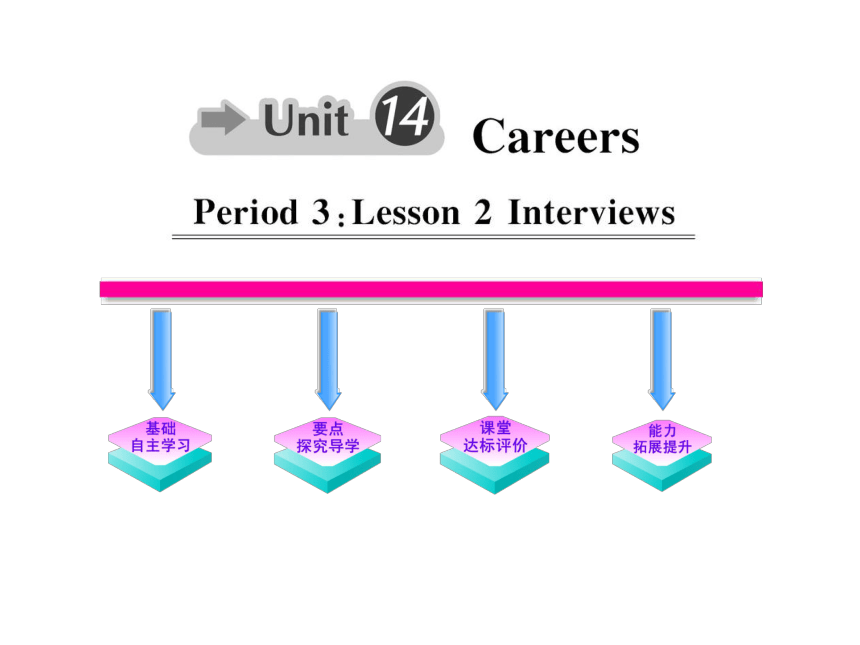 | |
| 格式 | rar | ||
| 文件大小 | 5.0MB | ||
| 资源类型 | 教案 | ||
| 版本资源 | 北师大版 | ||
| 科目 | 英语 | ||
| 更新时间 | 2011-11-06 16:44:37 | ||
图片预览


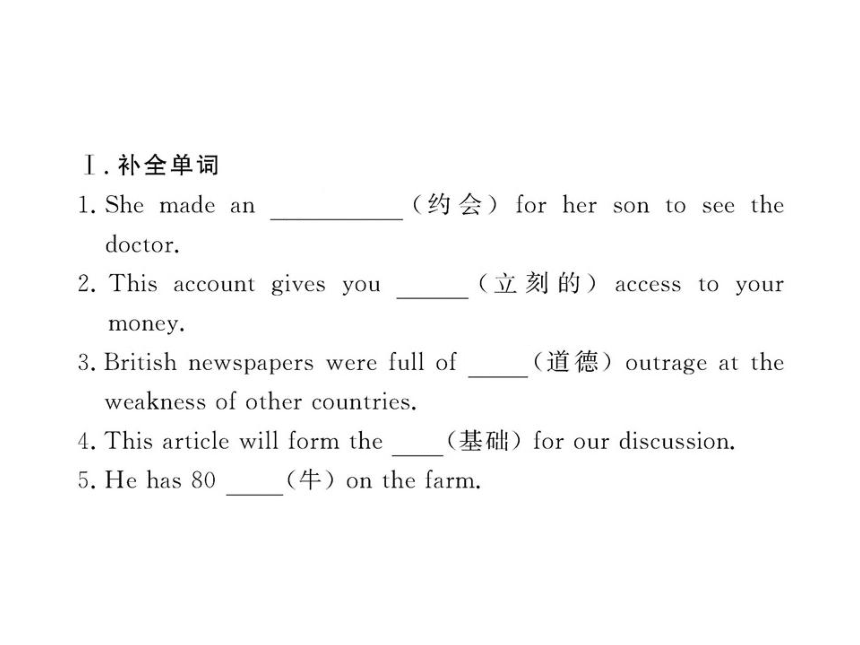
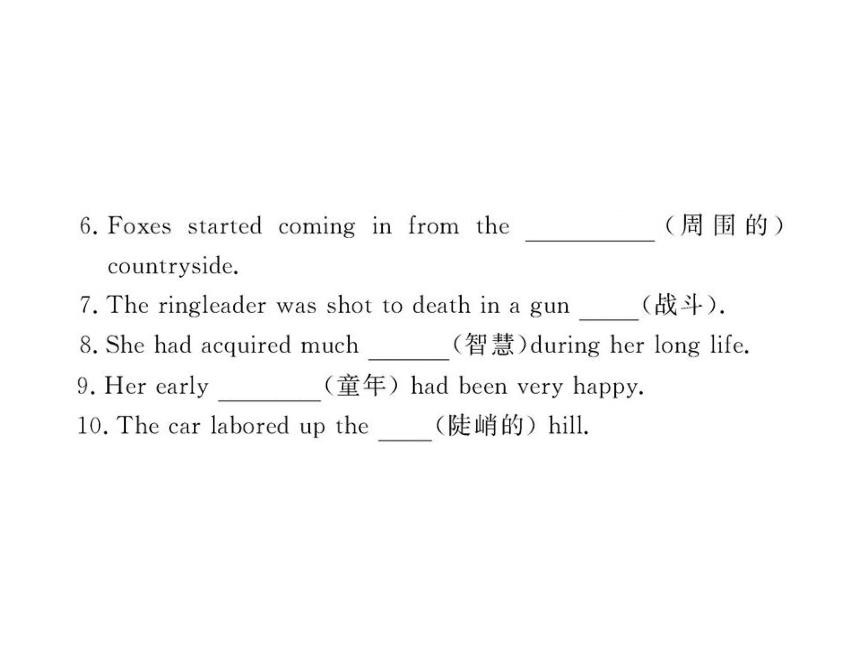
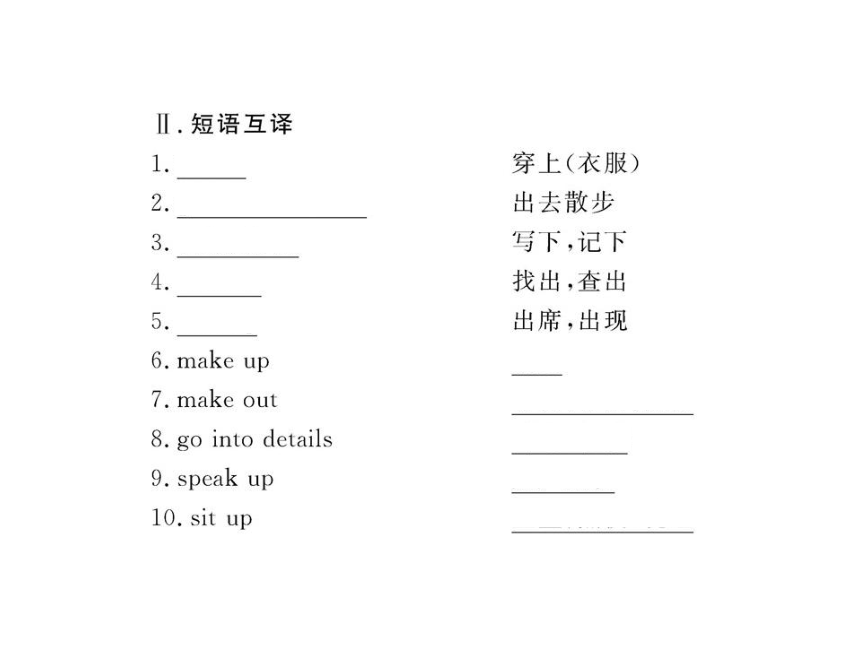

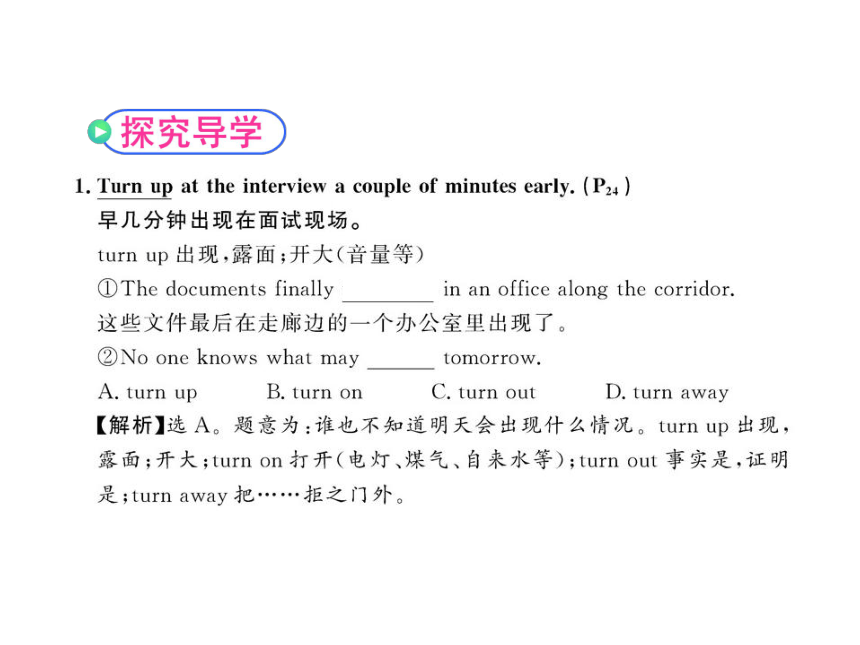
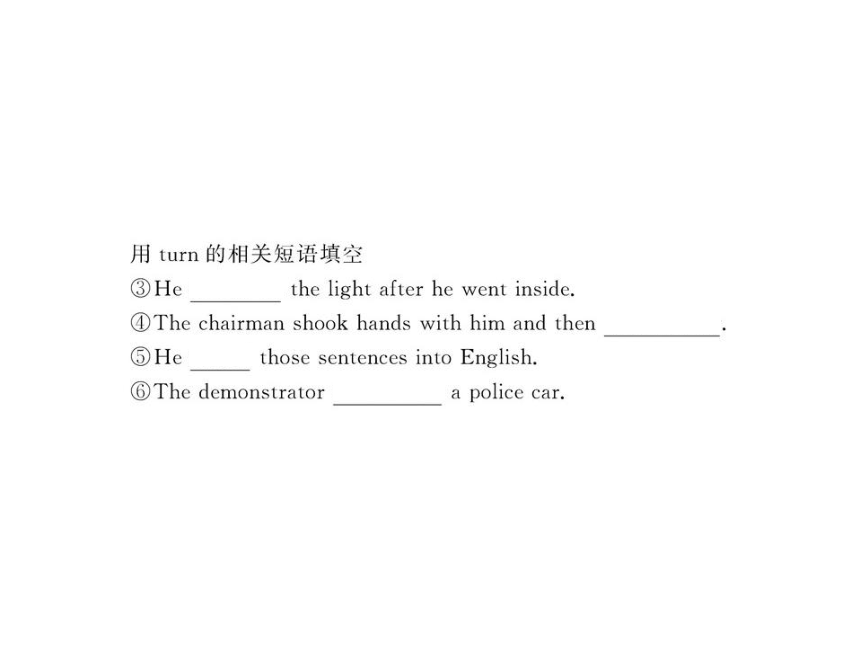
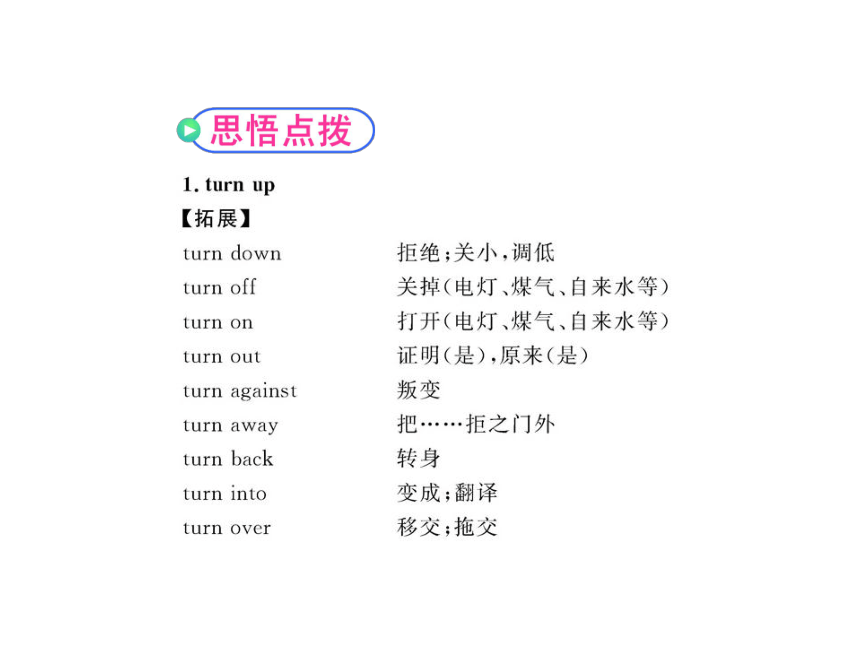
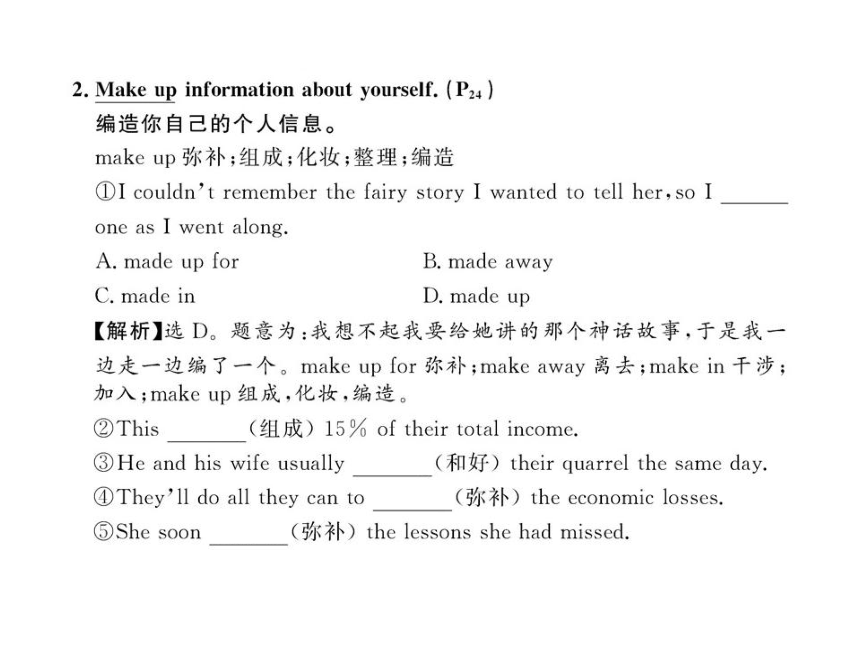
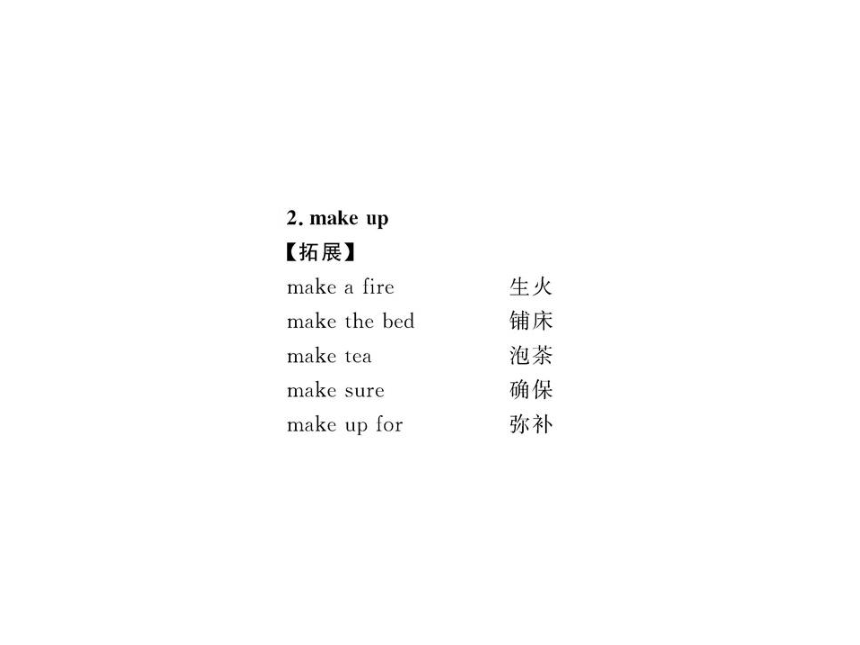
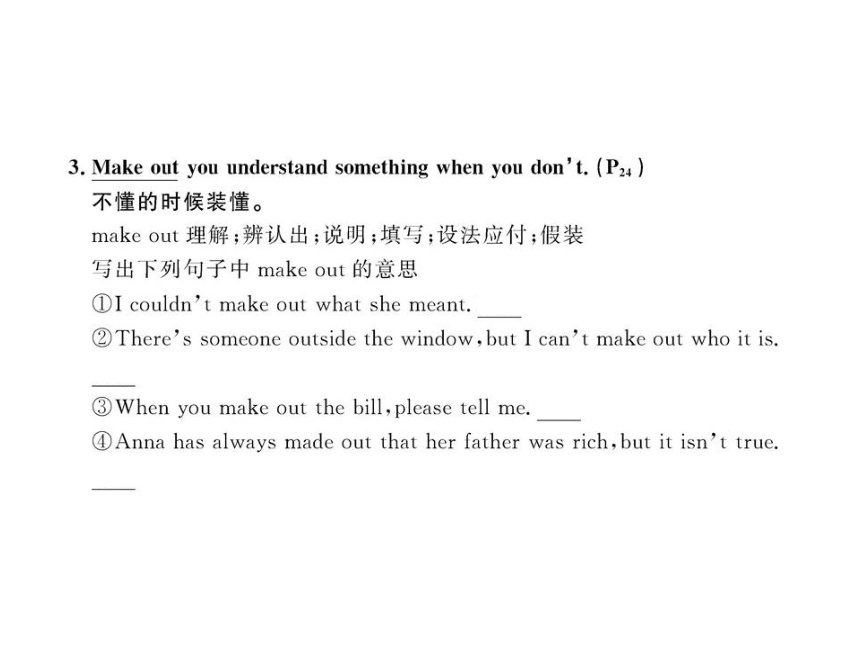
文档简介
(共54张PPT)
Ⅰ. 单词拼写
1. I turned up my collar (衣领) against the wind.
2. I’ve got a dental appointment (约会) at 3 o’clock.
3. She had a happy childhood (童年).
4. An instant (片刻) later the explosion occurred.
5. He refused the request on moral (道德) grounds.
6. The basis (基础) of her opinion is something she read in the magazine.
7. He didn’t pay much attention to his surroundings (周围环境).
8. The path grew steeper (陡峭的)as we climbed higher.
9. I would question the wisdom (智慧) of borrowing such a large sum of money.
10. He spoke in the idiom (方言) of the New England countryside.
Ⅱ. 补全句子
1. 整个故事完全是虚构出来的。
The whole story is made up .
2. 她脱下旧连衣裙, 穿上一件新的。
She took off the old dress and put on a new one.
3. 请查一下火车什么时候开。
Please find out when the train starts.
4. 发生了没有意料到的事情。
Something unexpected has turned up .
5. 他记下了她的演说。
He took down her speech.
6. 在浓雾中我几乎什么也看不见。
I could hardly make out anything in the thick fog.
7. 乔治叔叔在祈祷会中发表个人意见。
Uncle George spoke up in the prayer meeting.
8. 医生彻夜守着病人。
The doctor sat up all night with the patient.
Ⅲ. 单项填空
1. _______ our school’s teaching reform, the studying burdens on us students have already _______ lighter than before.
A. Owing to; turned on B. Due to; turned over
C. Despite; turned around D. Thanks to; turned out
【解析】选D。句意为: 多亏了我们学校的教学改革,结果,我们学生的学习负担比以前轻了。thanks to由于;多亏了;turn out结果是;证明是,符合题意。
2. You’d better _______ the lost time because of your long-term illness.
A. make up for B. make away
C. make sure D. make at
【解析】选A。句意为:因为你长期生病,你最好补上已丢失的时间。make away离去,逃走;make sure确保;make at攻击;make up for弥补。
3. _______ I saw him, I knew he was the man the police were looking for.
A. Each time B. Every time
C. The instant D. At the first time
【解析】选C。题意为:我一看到他我就知道他就是警察正在找的那个人。each/every time的意思是“每次做某事的时候”,不符合题意。at the first time后面不能接从句。
4. There are several reasons why I acted as I did, but I can’t _______ about them now.
A. come into detail B. come into details
C. go into details D. go into
【解析】选C。go into detail(s) about关于……进行细谈,符合题意。
5. I shall get back very late, so don’t _______ for me.
A. sit up B. sit down
C. sit around D. sit on
【解析】选A。题意为:今晚我要回来得很晚,所以你不必等我回来再睡觉了。sit up熬夜做某事;sit down坐下;sit around闲坐着;sit on坐在……上。故此题答案选A。
6. If you want to see the chairman of the department, you’d better make an _______ with his secretary first.
A. admission B. agreement
C. appointment D. assumption
【解析】选C。题意为:如果你想和系主席见面,你最好和他的秘书先预约一下。admission许可,承认;agreement协议;assumption假设;make an appointment约会,是固定短语,符合题意。
7. The movies produced in the 1930s established a solid base _______ a Chinese film industry could grow.
A. when B. that
C. on which D. for which
【解析】选C。此题考查的是定语从句,先行词是a solid base,由此可知此介词应该使用on,构成短语on the solid base。此处的base是名词,on the base是固定短语。
8. He didn’t make _______ clear when and where the meeting would be held.
A. this B. that C. it D. these
【解析】选C。句意为:他没有把何时何地召开会议搞清楚。句中“when and where the meeting would be held”为make的真正宾语,it为形式宾语,clear为宾语补足语。
9. The TV set he _______ works well now.
A. has repairing B. having repaired
C. has been repaired D. has had repaired
【解析】选D。本题考查学生综合能力。首先要知道he______是定语从句,对先行词The TV set进行修饰。由于The TV set在定语从句中作宾语,所以可以省略关系代词that或which。而定语从句中有have sth. done结构,即文章的句子为:The TV set that/ which he has had repaired works well now. 主句为The TV set works well now. 。
10. —Tim hadn’t passed the exam and was afraid of being scolded.
— _______ .
A. So it was with Jim B. So was Jim, his classmate
C. It’s the same with Jim D. Neither had Jim, his classmate
【解析】选A。So it was with Jim是指上一句的内容也适合另一个人。选项C中It’s改为It was才对。
LONDON—“Everyone else has one! ”
Lucy declared to her parents, trying to get a
mobile phone as a gift for her 14th birthday. Her parents gave in.
Curious to know how her daughter would use the phone, Jane Bidder, the mother, followed Lucy to the school bus in the morning. The bus seats 20 students, of whom half have a mobile phone. One mobile rings and several adolescent owners fumble with their bags.
Many parents have just come to realize that the mobile phone is no longer for traveling businessmen—it is as likely to be found in school bags.
The mobile phone seems to have become something essential for today’s teens in Britain, according to a survey published last week, by NOP, a leading market research company in Britain. Research found that 66 percent of 16-year-olds now have access to a mobile phone.
The mobile phone has been turned into a secret messaging service by teen users. When they are talking on the mobile, their parents are not able to eavesdrop on the second line.
The interview with 2, 019 young people aged 7 to 16 found that they favor the text messaging service because they offer a secret way of keeping in touch. The days of secret notes in the classroom are dying out.
For example, “cul” means “see you later”; “lol” means “laugh out loud”; and “2nite” is the abbreviation of “tonight”. All these are based on shorthand phrases on the Internet.
Many schools have banned students using mobile phones. But they are not very successful. Still phones ring in the class and disturb study. Besides, people are worried about the health risk to kids using mobile phones.
Scientists believe children are especially vulnerable(易受伤的)to mobile radiation.
1. The story of Lucy is told to show us_______ .
A. British parents always meet their children’s needs
B. British kids have good relationship with their parents
C. how British parents accept the truth of teenagers owning a mobile phone
D. why every child gets a mobile phone as a birthday present in UK
【解析】选C。主旨大意题。整篇文章通过Lucy拥有手机这件事情讲述了英国现存的一个现象,那就是学生大都拥有手机,而家长逐渐地接受了这个事实。
2. Which of the following statements is NOT true according to the passage
A. People worry about the harm to the kids’ health by using mobile phone.
B. Teenagers want to have their own secret.
C. Lucy does not get the mobile phone she wants.
D. Teenagers like to send messages to each other.
【解析】选C。细节理解题。根据第一段的Her parents gave in. 可知,Lucy的父母让步了,Lucy得到了她想要的手机。
3. The underlined word “eavesdrop”in paragraph 5 means _______.
A. join in actively B. interrupt rudely
C. watch carefully D. listen secretly
【解析】选D。词义猜测题。根据上文中的The mobile phone has been turned into a secret messaging service by teen users. 可猜测出此单词的意思是“偷听”的意思。
4. Interviews discover children like to send messages instead of _______.
A. calling each other B. writing to each other
C. playing games online D. greeting each other
【解析】选B。细节理解题。根据文中的The interview with 2, 019 young people aged 7 to 16 found that they favor the text messaging service because they offer a secret way of keeping in touch. 可知学生喜欢发短信而不是写信,因为这样会更安全。
Ⅰ. 单词拼写
1. I turned up my collar (衣领) against the wind.
2. I’ve got a dental appointment (约会) at 3 o’clock.
3. She had a happy childhood (童年).
4. An instant (片刻) later the explosion occurred.
5. He refused the request on moral (道德) grounds.
6. The basis (基础) of her opinion is something she read in the magazine.
7. He didn’t pay much attention to his surroundings (周围环境).
8. The path grew steeper (陡峭的)as we climbed higher.
9. I would question the wisdom (智慧) of borrowing such a large sum of money.
10. He spoke in the idiom (方言) of the New England countryside.
Ⅱ. 补全句子
1. 整个故事完全是虚构出来的。
The whole story is made up .
2. 她脱下旧连衣裙, 穿上一件新的。
She took off the old dress and put on a new one.
3. 请查一下火车什么时候开。
Please find out when the train starts.
4. 发生了没有意料到的事情。
Something unexpected has turned up .
5. 他记下了她的演说。
He took down her speech.
6. 在浓雾中我几乎什么也看不见。
I could hardly make out anything in the thick fog.
7. 乔治叔叔在祈祷会中发表个人意见。
Uncle George spoke up in the prayer meeting.
8. 医生彻夜守着病人。
The doctor sat up all night with the patient.
Ⅲ. 单项填空
1. _______ our school’s teaching reform, the studying burdens on us students have already _______ lighter than before.
A. Owing to; turned on B. Due to; turned over
C. Despite; turned around D. Thanks to; turned out
【解析】选D。句意为: 多亏了我们学校的教学改革,结果,我们学生的学习负担比以前轻了。thanks to由于;多亏了;turn out结果是;证明是,符合题意。
2. You’d better _______ the lost time because of your long-term illness.
A. make up for B. make away
C. make sure D. make at
【解析】选A。句意为:因为你长期生病,你最好补上已丢失的时间。make away离去,逃走;make sure确保;make at攻击;make up for弥补。
3. _______ I saw him, I knew he was the man the police were looking for.
A. Each time B. Every time
C. The instant D. At the first time
【解析】选C。题意为:我一看到他我就知道他就是警察正在找的那个人。each/every time的意思是“每次做某事的时候”,不符合题意。at the first time后面不能接从句。
4. There are several reasons why I acted as I did, but I can’t _______ about them now.
A. come into detail B. come into details
C. go into details D. go into
【解析】选C。go into detail(s) about关于……进行细谈,符合题意。
5. I shall get back very late, so don’t _______ for me.
A. sit up B. sit down
C. sit around D. sit on
【解析】选A。题意为:今晚我要回来得很晚,所以你不必等我回来再睡觉了。sit up熬夜做某事;sit down坐下;sit around闲坐着;sit on坐在……上。故此题答案选A。
6. If you want to see the chairman of the department, you’d better make an _______ with his secretary first.
A. admission B. agreement
C. appointment D. assumption
【解析】选C。题意为:如果你想和系主席见面,你最好和他的秘书先预约一下。admission许可,承认;agreement协议;assumption假设;make an appointment约会,是固定短语,符合题意。
7. The movies produced in the 1930s established a solid base _______ a Chinese film industry could grow.
A. when B. that
C. on which D. for which
【解析】选C。此题考查的是定语从句,先行词是a solid base,由此可知此介词应该使用on,构成短语on the solid base。此处的base是名词,on the base是固定短语。
8. He didn’t make _______ clear when and where the meeting would be held.
A. this B. that C. it D. these
【解析】选C。句意为:他没有把何时何地召开会议搞清楚。句中“when and where the meeting would be held”为make的真正宾语,it为形式宾语,clear为宾语补足语。
9. The TV set he _______ works well now.
A. has repairing B. having repaired
C. has been repaired D. has had repaired
【解析】选D。本题考查学生综合能力。首先要知道he______是定语从句,对先行词The TV set进行修饰。由于The TV set在定语从句中作宾语,所以可以省略关系代词that或which。而定语从句中有have sth. done结构,即文章的句子为:The TV set that/ which he has had repaired works well now. 主句为The TV set works well now. 。
10. —Tim hadn’t passed the exam and was afraid of being scolded.
— _______ .
A. So it was with Jim B. So was Jim, his classmate
C. It’s the same with Jim D. Neither had Jim, his classmate
【解析】选A。So it was with Jim是指上一句的内容也适合另一个人。选项C中It’s改为It was才对。
LONDON—“Everyone else has one! ”
Lucy declared to her parents, trying to get a
mobile phone as a gift for her 14th birthday. Her parents gave in.
Curious to know how her daughter would use the phone, Jane Bidder, the mother, followed Lucy to the school bus in the morning. The bus seats 20 students, of whom half have a mobile phone. One mobile rings and several adolescent owners fumble with their bags.
Many parents have just come to realize that the mobile phone is no longer for traveling businessmen—it is as likely to be found in school bags.
The mobile phone seems to have become something essential for today’s teens in Britain, according to a survey published last week, by NOP, a leading market research company in Britain. Research found that 66 percent of 16-year-olds now have access to a mobile phone.
The mobile phone has been turned into a secret messaging service by teen users. When they are talking on the mobile, their parents are not able to eavesdrop on the second line.
The interview with 2, 019 young people aged 7 to 16 found that they favor the text messaging service because they offer a secret way of keeping in touch. The days of secret notes in the classroom are dying out.
For example, “cul” means “see you later”; “lol” means “laugh out loud”; and “2nite” is the abbreviation of “tonight”. All these are based on shorthand phrases on the Internet.
Many schools have banned students using mobile phones. But they are not very successful. Still phones ring in the class and disturb study. Besides, people are worried about the health risk to kids using mobile phones.
Scientists believe children are especially vulnerable(易受伤的)to mobile radiation.
1. The story of Lucy is told to show us_______ .
A. British parents always meet their children’s needs
B. British kids have good relationship with their parents
C. how British parents accept the truth of teenagers owning a mobile phone
D. why every child gets a mobile phone as a birthday present in UK
【解析】选C。主旨大意题。整篇文章通过Lucy拥有手机这件事情讲述了英国现存的一个现象,那就是学生大都拥有手机,而家长逐渐地接受了这个事实。
2. Which of the following statements is NOT true according to the passage
A. People worry about the harm to the kids’ health by using mobile phone.
B. Teenagers want to have their own secret.
C. Lucy does not get the mobile phone she wants.
D. Teenagers like to send messages to each other.
【解析】选C。细节理解题。根据第一段的Her parents gave in. 可知,Lucy的父母让步了,Lucy得到了她想要的手机。
3. The underlined word “eavesdrop”in paragraph 5 means _______.
A. join in actively B. interrupt rudely
C. watch carefully D. listen secretly
【解析】选D。词义猜测题。根据上文中的The mobile phone has been turned into a secret messaging service by teen users. 可猜测出此单词的意思是“偷听”的意思。
4. Interviews discover children like to send messages instead of _______.
A. calling each other B. writing to each other
C. playing games online D. greeting each other
【解析】选B。细节理解题。根据文中的The interview with 2, 019 young people aged 7 to 16 found that they favor the text messaging service because they offer a secret way of keeping in touch. 可知学生喜欢发短信而不是写信,因为这样会更安全。
